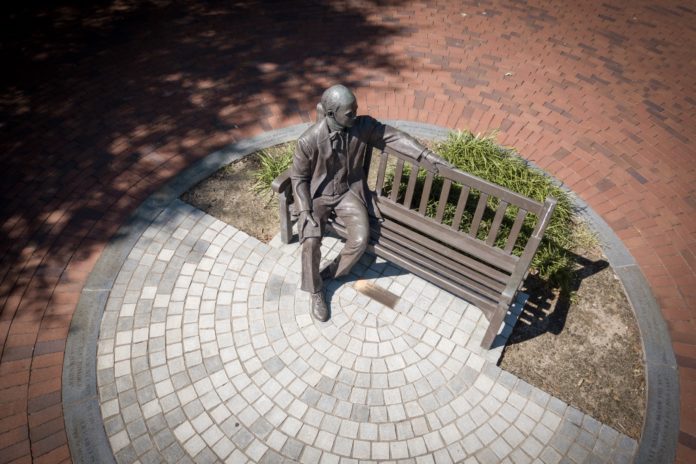MACON — Prominent economists – including a Nobel Prize winner – will be featured throughout the spring as part of the Mercer University Stetson School of Business and Economics lecture series titled “Readings in Political Economy.” To be held on the Macon campus, the series kicks off on Jan. 27, when Auburn University’s Dr. Robert Lawson will deliver a lecture on economic freedom at 6 p.m. in the Medical School Auditorium. The lecture series will also include a presentation by the 2002 Nobel Prize winner in economics, Dr. Vernon Smith, on March 16.
The events are part of a course developed by Dr. Scott Beaulier, chair of the Economics Department and assistant professor, through a grant from the Charles G. Koch Charitable Foundation.
All five events are free and open to the public and begin at 6 p.m.
Dr. Robert Lawson
Tuesday, Jan. 27
Topic: Economic Freedom
Medical School Auditorium
Dr. Lawson is an associate professor in the Department of Finance at Auburn University, co-director of the Center for International Finance and Global Competitiveness, director of the Economic Freedom Initiative and the co-author of the widely-cited Economic Freedom of the World annual report, which provides an economic freedom index of more than 140 countries.
Dr. Benjamin Powell
Topic: Globalization and Sweatshops
Monday, Feb. 23
Stetson Hall, Room 251
Dr. Powell is an assistant professor of economics at Suffolk University, a senior economist with the Beacon Hill Institute and a research fellow with the Independent Institute. He is editor of the book, Making Poor Nations Rich: Entrepreneurship and the Process of Development, published in 2008.
Dr. Vernon L. Smith
Topic: Experimental Economics
Monday, March 16
Stetson Hall, Room 251
Dr. Smith won the 2002 Nobel Prize in Economics for his work in the field of experimental economics and serves as professor of economics and law at Chapman University. He has published three books on experimental economics, including: Papers in Experimental Economics (1991), Bargaining and Market Behavior (2000) and Rationality in Economics: Constructivist and Ecological Forms (2008).
Dr. Peter Boettke
Tuesday, March 31
Topic: Lawlessness and Self-Regulation of Markets
Medical School Auditorium
Dr. Boettke is the BB&T Professor for the Study of Capitalism, vice president for research, and research director for the Global Prosperity Initiative at the Mercatus Center at George Mason University. He is also a university professor of economics at George Mason and the deputy director of the James M. Buchanan Center for Political Economy. He is the author of three books on the history, collapse and transition from socialism in the former Soviet Union and he is also the co-author, along with David Prychitko and Paul Heyne, of the classic principles of economics text, The Economic Way of Thinking (2002), which is in its 10th edition.
Dr. Bruce Yandle
Topic: Regulation and public choice economics
Monday, April 27
Stetson Hall Room 251
Dr. Yandle, a Mercer alumnus, is professor of economics emeritus and the dean emeritus of the College of Business and Behavioral Science at Clemson University. He was a senior economist on the President’s Council on Wage and Price Stability during the Ford and Carter administrations and executive director of the Federal Trade Commission during the Reagan administration. Dr. Yandle teaches in George Mason University’s Capitol Hill campus in Washington, D.C. He is also a senior associate with the Property and Environmental Research Center in Bozeman, Mont. Dr. Yandle is the author or editor of a dozen books on regulation and writes a quarterly newsletter on the economy for Clemson University’s Strom Thurmond Institute.
About the Eugene W. Stetson School of Business and Economics at Mercer:
Established in 1984, the Eugene W. Stetson School of Business and Economics has bachelor’s, MBA, Professional MBA, Executive MBA and Master of Accountancy degrees in five locations. The School holds accreditation from the prestigious AACSB International — The Association to Advance Collegiate Schools of Business, considered the hallmark of excellence among the nation’s top business schools and placing it among the top 25 percent of all business schools in the world. For 2009, the Princeton Review recognized the School as No. 3 for “Greatest Opportunity for Women” and one of its “Best 296 Business Schools.”
About Mercer University:
Founded in 1833, Mercer University is a dynamic and comprehensive center of undergraduate, graduate and professional education. The University has more than 7,500 students; 11 schools and colleges – liberal arts, law, pharmacy, medicine, business, engineering, education, theology, music, nursing and continuing and professional studies; major campuses in Macon, Atlanta and Savannah; three regional academic centers across the state; a university press; two teaching hospitals — Memorial University Medical Center and the Medical Center of Central Georgia; educational partnerships with Warner Robins Air Logistics Center in Warner Robins and Piedmont Healthcare in Atlanta; an engineering research center in Warner Robins; a performing arts center in Macon; and a NCAA Division I athletic program. For more information, visit www.mercer.edu.
— 30 —










